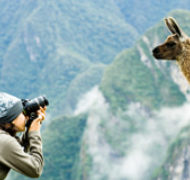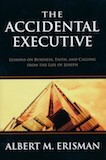Everything Matters: Travel as a Cultural Act
Blog / Produced by The High Calling
I´m writing this from a bar in a hostel in Cusco, Peru—the former capital of the ancient Incan empire. This city´s history is rich with culture. And within this hostel, too, there is a collision of cultures: a young Australian man who wants to see the world, a Canadian couple preparing to go on a wilderness trek together, and a host of Europeans who, thus far, have demonstrated a propensity for monopolizing the hostel´s community ping-pong table.
This building itself is more than 500 years old—or, in other words, more than twice as old as the United States of America, the country my fellow travelers and I call home. The sixteen of us—thirteen college students and three leaders—set out two weeks ago to serve and immerse ourselves in Peruvian culture. But even though experiencing a different culture was part of the plan, it hasn´t always been easy. Not when bathrooms are sometimes nothing more than a hole in the ground, water needs to be filtered or boiled, and (much to my chagrin right now) even the computer keyboards are in Spanish.
Mark Twain once wrote "travel is fatal to prejudice, bigotry, and narrow-mindedness." He went on to say that "broad, wholesome, charitable views of men and things cannot be acquired by vegetating in our little corner of the earth all one´s lifetime."
For many Americans (myself included), we are not only guilty of "vegetating in our little corner" but also guilty of believing that our little corner is right. And maybe even believing that we don´t need to experience other cultures. After all, we have toilets, sewage systems capable of disposing toilet paper, and grocery stores that sell peanut butter—signposts of cultural success, right?
During these weeks of traveling, we´ve constantly caught ourselves believing our culture is superior: every time we´re in a taxi and the driver weaves through traffic or comes alongside two other cars in a two-lane street, every time we buy groceries and wonder about why milk and eggs aren´t refrigerated, and every time we (me especially) don´t even feel an ounce of guilt for being unable to speak Spanish (no matter how many times we´ve been annoyed by encounters with people in the U.S. who don´t speak English).
But why does any of this matter? What exactly makes travel a cultural act? Like a novel, travel introduces us to other people and places—it´s a temporary journey or exploration. The difference, however, is that the novel always resolves itself, not only for the characters but also for the reader. And there´s never any risk of the reader getting embarrassed, lost, or desperate. Travel, on the other hand, does not provide such assurances.
As a writer, words have always been my friend... until I came to Peru and suddenly even the most grammatically correct English is worthless when I try to communicate with the Spanish-speaking woman in the checkout line. Suddenly I´m not so competent, so secure, or so…in control. Suddenly I realize that the novel isn´t all about me.
And it´s more than just the language barrier. Travel broadens our awareness; it shatters the glass boxes that hold our preconceptions—revealing just how small they were only after new experiences no longer fit within them.
What we´re left with is a richer understanding of people, food, languages, lifestyles, clothing, the beauty of God´s creation, experiences, and even—perhaps most importantly—our own insignifiance. In our own daily routine, it can be fairly easy to start believing that we´re important, necessary. Travel enough and that illusion begins to fade, as I am learning. Then we´re free to enjoy the novel in which we´re fortunate enough to play a role, but without the conviction that our name should be in the title.
* * * * *
The "Everything Matters" Collection
- Creating a High Calling Culture
- Everything Matters: Editing as a Cultural Act
- Everything Matters: Easter as a Cultural Act
- Everything Matters: Teaching as a Cultural Act
- Everything Matters: From Rusty Chevy to Chrome-Plated Couch
- Everything Matters: Managing Operations as a Cultural Act
- Everything Matters: Reading as a Cultural Act
- Everything Matters: Hospitality as a Cultural Act
- Everything Matters: Living Alone as a Cultural Act
- Everything Matters: Travel as a Cultural Act
- Everything Matters: Public Relations as a Cultural Act
- Everything Matters: Playing Video Games as a Cultural Act
- Everything Matters: Book Publicity as a Cultural Act
Image by Guillermo Barrios del Valle. Used with permission. Sourced via Flickr.





